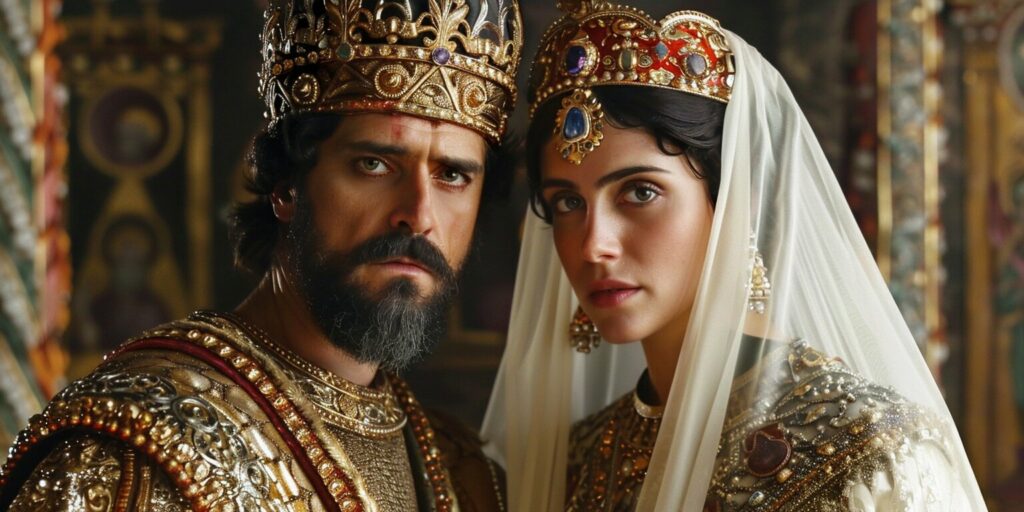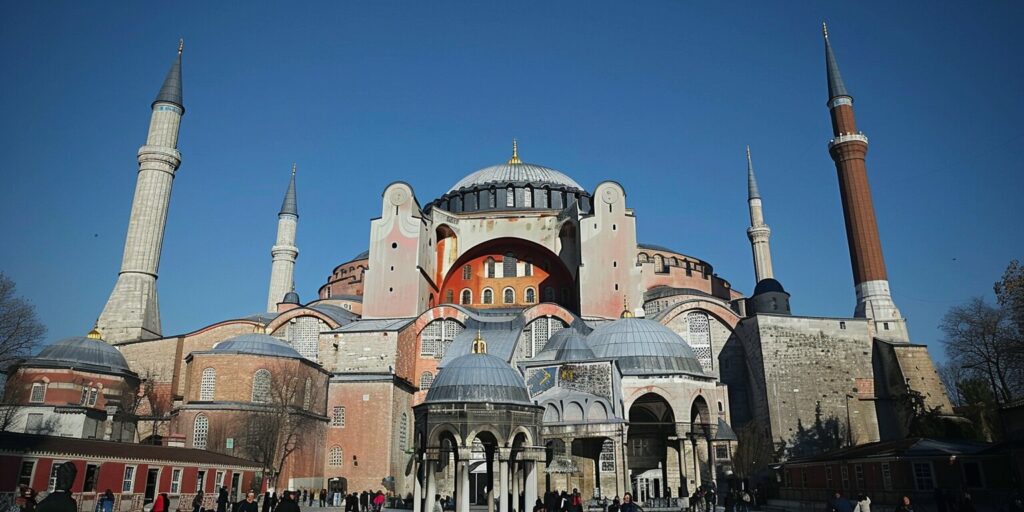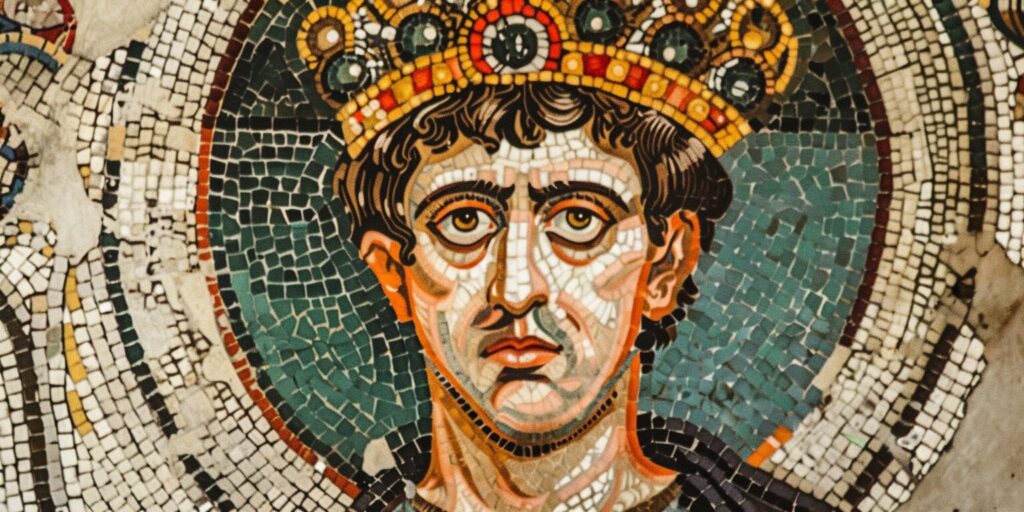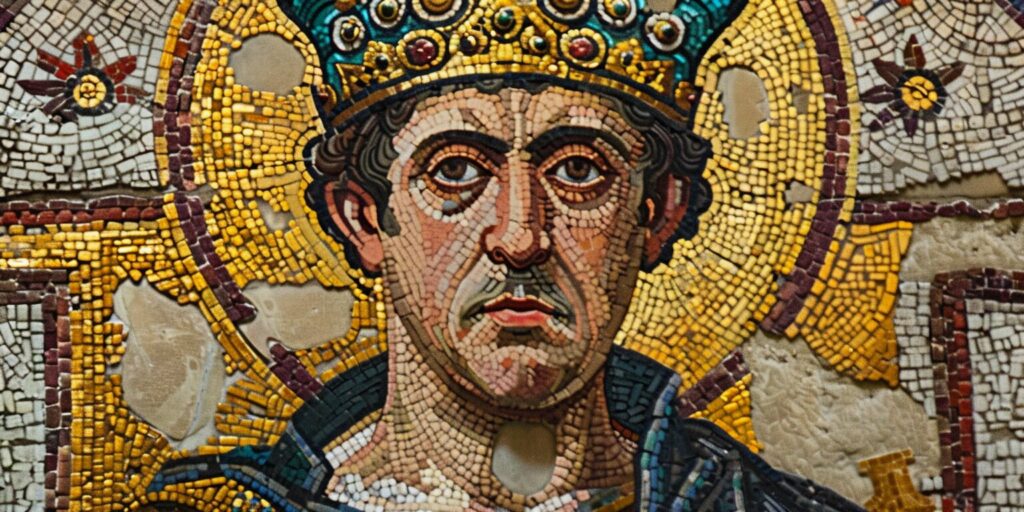Welcome to our in-depth exploration of the captivating biography of Justinian the Great, the influential Byzantine Emperor. In this article, we will delve into his life, achievements, and the lasting impact he had on the Byzantine Empire. From his early beginnings to his reign and accomplishments, we will uncover the fascinating story of Justinian the Great biography and the legacy he left behind.
Early Life and Rise to Power
Justinian, the future Byzantine Emperor, was born in Tauresium, Illyria (modern-day North Macedonia) in 482 AD. Little is known about his early life, but he hailed from a humble peasant family living on the Byzantine Empire’s fringes. Despite his modest upbringing, Justinian displayed remarkable intelligence and ambition from a young age.
Justinian received a comprehensive education in classical literature, philosophy, and law as a child. His thirst for knowledge and his ability to grasp complex concepts propelled him forward. At the age of 20, Justinian moved to Constantinople, the capital of the Byzantine Empire, to pursue his legal studies.
Justinian’s rise to power began when he caught his uncle’s attention, Emperor Justin I. Recognizing Justinian’s intelligence and potential, Justin appointed him as his co-emperor in 527 AD. This move ensured a smooth succession and allowed Justinian to gain valuable experience in governing the empire.
Tragically, Emperor Justin I passed away in the same year, and Justinian ascended to the throne as the sole ruler of the Byzantine Empire. This marked the start of a transformative era that would see the empire reach unprecedented heights of power and influence.
Key Events that Shaped Justinian’s Path to Power:
- Intellectual Training: Justinian’s comprehensive education laid the foundation for his future achievements.
- Rise to Co-Emperor: Appointed as co-emperor by his uncle, Justin, Justinian gained valuable experience in governance.
- Ascension to the Throne: After Justin’s death, Justinian became the sole ruler of the Byzantine Empire.
With his newfound power, Justinian embarked on a mission to restore the Roman Empire’s former glory and solidify his reign as one of the greatest Byzantine emperors in history.
Reign and Achievements
During his illustrious reign, Emperor Justinian accomplished remarkable feats that shaped the Byzantine Empire and impacted history.
Military Conquests
Emperor Justinian’s military campaigns were instrumental in expanding the borders of the Byzantine Empire. He set his sights on reclaiming territories that were once part of the Roman Empire.
- Reconquered North Africa: Justinian successfully reclaimed vast territories in North Africa, including regions that had fallen under Vandal rule.
- Restored Italy: Under his command, the Byzantine forces managed to recapture parts of Italy, including Rome, which had been under Ostrogoth’s control.
- Expanding Eastern Frontiers: Justinian launched successful military expeditions to secure the empire’s eastern borders, fighting off threats from various nomadic tribes.
Monumental Construction
Justinian is renowned for his ambitious building projects that transformed the Byzantine Empire’s architecture and culture. These grand structures showcased the empire’s power and wealth.
- Hagia Sophia: One of his most notable achievements, Hagia Sophia, a masterpiece of Byzantine architecture, stands as a testament to Justinian’s vision and engineering prowess.
- Byzantine Fortifications: Justinian oversaw the construction and restoration of numerous fortifications, including city walls and defensive structures, strengthening the empire’s defenses.
- Ravenna Mosaics: In Ravenna, Italy, Justinian sponsored the creation of awe-inspiring mosaics, demonstrating the empire’s artistic and cultural influence.
Justinian’s reign was marked by his commitment to upholding Roman values, reviving Roman law, and preserving the Byzantine Empire’s legacy. His efforts to unify and protect the empire’s territories and his keen interest in architectural and cultural advancements solidified his status as one of the most influential rulers in history.
Justinian Code of Law
The Justinian Code of Law is one of Emperor Justinian’s most significant contributions. This legal system, also known as the Corpus Juris Civilis, profoundly impacted the legal landscape of Justinian’s Byzantine Empire and continues to influence Western legal traditions to this day.
The Justinian Code encompassed a comprehensive set of laws aiming to streamline and organize the existing legal statutes. Its implementation addressed the complexities and inconsistencies plaguing the Byzantine legal system. The Code brought together laws from various sources, including Roman laws, imperial edicts, and legal commentaries, ensuring a more cohesive and accessible body of legislation.
One key aspect of the Justinian Code was its emphasis on clarity and logic. The laws were organized into a logical framework, making them more easily understandable and applicable. This organization allowed for quicker resolution of legal disputes, enabling a more efficient and fair judicial system.
The Justinian Code of Law influenced Western legal traditions in several ways. Its principles and concepts formed the foundation for subsequent legal systems in Europe. The code’s focus on codification and uniformity inspired legal scholars and lawmakers in the Middle Ages and Renaissance periods.
The lasting impact of the Justinian Code is evident in contemporary legal systems. Its emphasis on equality before the law, protection of property rights, and the idea of legal certainty laid the groundwork for modern legal principles. In many ways, the Justinian Code of Law still serves as a cornerstone for the rule of law in Western societies.
Justinian and Theodora
Explore the captivating partnership between Emperor Justinian and his influential wife, Theodora. Together, they formed a formidable team that reshaped the Byzantine Empire. Theodora, a former actress, was not only Justinian’s beloved wife but also his trusted advisor and political ally.

Justinian and Theodora shared power during their reign, and Theodora played a pivotal role in shaping Justinian’s rule. Her unconventional rise to power and strong influence challenged the traditional norms of Byzantine society. Theodora’s intelligence, charisma, and determination made her a key figure in the imperial court.
Under Theodora’s guidance, Justinian implemented numerous reforms that benefited women and the lower classes. Together, they worked to protect the rights of women, improve the legal system, and combat corrupt practices. Theodora’s advocacy for marginalized groups and her efforts to abolish forced prostitution were revolutionary for the time.
Furthermore, Theodora’s influence extended beyond social and political matters. She actively supported Justinian during times of crisis and played an instrumental role in managing the empire’s affairs while he was away. Her intelligence and diplomatic skills helped her navigate difficult situations and maintain stability.
The partnership between Justinian and Theodora is a testament to their shared vision and unyielding determination. Their enduring legacy shaped the Byzantine Empire and cemented their names in history as a formidable power couple.
The Justinian Empire History
Embark on a journey through time as we trace the fascinating history of the Justinian Empire, a period marked by significant events and remarkable developments under the rule of Emperor Justinian.
Political Landscape
During the Justinian Empire, the political landscape underwent profound changes. Emperor Justinian implemented various reforms to consolidate his power and strengthen the central authority. His ambitious military campaigns aimed to reclaim lost territories and restore the glory of the Roman Empire.
Cultural Brilliance
The Justinian Empire was a cultural brilliance hub characterized by a flourishing art scene, advanced architectural achievements, and intellectual pursuits. Under Emperor Justinian’s patronage, marvelous structures like the Hagia Sophia were erected, exemplifying grandeur and craftsmanship.
Religious Influence
The Justinian Empire also witnessed substantial religious influence. Justinian’s efforts to reconcile theological disputes led to the codification of Christian doctrine. His commitment to religious orthodoxy resulted in the construction of numerous churches, emphasizing his devotion to the Christian faith.
Key Developments
- The reconquest of territories, such as North Africa and Italy, contributed to the expansion of the empire.
- The codification of Roman law, known as the Justinian Code, revolutionized legal systems and helped shape legal principles.
- The Nika riots, a pivotal event in Constantinople, challenged Justinian’s rule but ultimately reinforced his authority.
- The architectural and engineering marvel of the Hagia Sophia showcased the empire’s advancements.
With its intricate tapestry of political dynamics, cultural brilliance, and religious influence, the Justinian Empire left an indelible mark on history. The reign of Emperor Justinian paved the way for significant societal, legal, and artistic transformations that continue to intrigue and inspire scholars and history enthusiasts to this day.
Summary of Justinian’s Reign
During Emperor Justinian’s reign, which lasted from 527 to 565 AD, the Byzantine Empire witnessed significant transformation and achievement. Justinian’s reign left an indelible mark on the empire and the world.
Accomplishments
Justinian’s reign was marked by numerous accomplishments that shaped the Byzantine Empire. One of his most notable achievements was the reconquest of former territories, including North Africa and Italy. Through these military campaigns, Justinian sought to restore the glory of the Roman Empire.
Justinian’s reign also saw the construction of magnificent architectural wonders, such as the Hagia Sophia. This iconic cathedral, known for its grand dome and intricate mosaics, stands as a testament to Byzantine engineering and artistic prowess.

Furthermore, Justinian’s legal reforms, codified under the Justinian Code of Law, had a lasting impact on the Byzantine legal system. This comprehensive legal code laid the foundation for Western legal traditions and influenced jurisprudence for centuries to come.
Challenges Faced
Despite his many accomplishments, Justinian faced numerous challenges throughout his reign. One of the greatest challenges was the constant threat of barbarian invasions and internal conflicts. These disruptions often posed a threat to the security and stability of the empire.
Moreover, the outbreak of the devastating Bubonic Plague, commonly known as the Justinian Plague, took a toll on the population and economy of the Byzantine Empire. The plague ravaged both urban and rural areas, leading to widespread death and economic decline.
Enduring Changes
Justinian’s reign brought about enduring changes that shaped the Byzantine Empire and beyond. His legal reforms influenced the Byzantine legal system and profoundly impacted the development of legal systems throughout Europe.
Justinian’s reconquest of former territories also expanded the Byzantine Empire’s influence and power. The empire’s cultural and intellectual contributions spread throughout the Mediterranean, fostering a vibrant exchange of ideas and knowledge.
Justinian’s reign marked a pivotal period in Byzantine history, characterized by accomplishments, challenges, and enduring changes. His remarkable legacy continues to captivate scholars and historians, highlighting his significant impact on the Byzantine Empire and the world at large.
Enduring Impact of Justinian’s Reign
Justinian’s reign had a profound and lasting impact on Byzantine society, culture, and governance. His achievements continue to shape history and leave an indelible mark on the world even to this day.
Social Impact
Under Justinian’s rule, Byzantine society experienced significant social transformations. His policies aimed to restore the glory of the Roman Empire by promoting art, literature, and education. The patronage of scholars and artists contributed to the preservation and revival of classical knowledge, ultimately influencing the development of Western civilization.
Justinian’s reign also witnessed advancements in women’s rights. Empress Theodora, Justinian’s influential wife, played a prominent role in empowering women and advocating for their rights. Her influence and status challenged societal norms and paved the way for future advancements in gender equality.
Cultural Legacy
Thanks to Justinian’s patronage of the arts and architecture, Byzantine culture reached new heights during his reign. With its magnificent dome, iconic structures like the Hagia Sophia became symbols of Byzantine grandeur and continue to inspire awe and admiration. The fusion of Eastern and Western influences in Byzantine art and architecture left an enduring legacy that shaped subsequent artistic movements.
Additionally, Justinian’s commitment to preserving and codifying Roman law through the Justinian Code profoundly impacted legal systems throughout Europe. His code served as the foundation for modern legal principles and influenced the development of civil law in various jurisdictions.
Governance and Administration
Justinian’s reign marked a period of significant administrative reforms. His efforts to streamline bureaucracy, improve tax collection, and enforce centralized control over the empire’s regions brought stability and efficiency to Byzantine governance. These reforms laid the groundwork for future generations of Byzantine rulers and contributed to the empire’s longevity.

Furthermore, Justinian’s military campaigns aimed at reclaiming lost territories, such as the reconquest of Italy and North Africa, expanded the Byzantine Empire’s influence and secured its borders. The territorial gains made during his reign shaped the geopolitical landscape of the Mediterranean region for centuries to come.
Justinian’s achievements:
- Preservation and revival of classical knowledge
- Advancements in women’s rights
- Iconic architectural masterpieces
- Influence on Western legal traditions through the Justinian Code
- Efficient governance and centralized administration
- Military campaigns that expanded the Byzantine Empire
Justinian’s reign embodies an era of profound change and enduring impact. His accomplishments, ranging from cultural and societal advancements to governance and territorial expansion, firmly place him as one of the most influential figures in Byzantine and world history.
Conclusion
Justinian the Great was a truly remarkable figure in Byzantine history. Justinian’s life was filled with triumphs and challenges, from humble beginnings to rising to power as the Byzantine Emperor.
During his reign, Justinian accomplished great feats, transforming the Byzantine Empire through military conquests, monumental construction projects, and the development of the Justinian Code of Law. His rule, alongside his influential wife Theodora, left a lasting impact on the empire’s political, cultural, and religious landscape.
Today, Justinian’s legacy continues to shape history. His achievements and enduring impact on Byzantine society, culture, and governance are still felt to this day. Justinian the Great will always be remembered as one of the most influential emperors in Byzantine history, whose reign brought about significant changes and transformed the empire for future generations.

